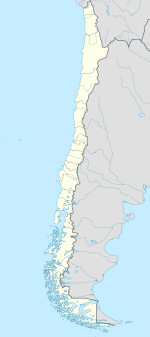Pelluhue
| Pelluhue | |||||
|---|---|---|---|---|---|
| Town and Commune | |||||
|
|||||
| Coordinates (city): 35°48′S 72°34′W / 35.800°S 72.567°WCoordinates: 35°48′S 72°34′W / 35.800°S 72.567°W | |||||
| Country | Chile | ||||
| Region | Maule | ||||
| Province | Cauquenes | ||||
| Government | |||||
| • Type | Municipality | ||||
| • Alcalde | Carlos Zúñiga Villaseñor (UDI) | ||||
| Area | |||||
| • Total | 371.4 km2 (143.4 sq mi) | ||||
| Elevation | 11 m (36 ft) | ||||
| Population (2012 Census) | |||||
| • Total | 6,620 | ||||
| • Density | 18/km2 (46/sq mi) | ||||
| • Urban | 6,414 | ||||
| • Rural | 3,877 | ||||
| Demonym(s) | Pelluhuano | ||||
| Sex | |||||
| • Men | 3,408 | ||||
| • Women | 3,006 | ||||
| Time zone | CLT (UTC-4) | ||||
| • Summer (DST) | CLST (UTC-3) | ||||
| Postal code | 3710000 | ||||
| Area code(s) | 56 + 73 | ||||
| Website | www |
||||
Pelluhue (in Mapudungun: land of clams) is a town and commune in the Cauquenes Province of central Chile's seventh region of Maule.
The commune of Pelluhue has an area of 371.4 km2 (143 sq mi) and is bordered on the north by Chanco, on the south by Cobquecura (Ñuble Province), on the east by Cauquenes and on the west by the Pacific Ocean. Its seat is the town of Curanipe.
Although Curanipe is the municipal seat, Pelluhue has a greater population, both permanent and seasonal. According to the 2002 census of the National Statistics Institute, Pelluhue spans an area of 371.4 km2 (143 sq mi) and has 6,414 inhabitants (3,408 men and 3,006 women). Of these, 3,877 (60.4%) lived in urban areas and 2,537 (39.6%) in rural areas. Because of its appeal as a tourism and retirement center, Pelluhue has been steadily growing over the last two decades. Its population increase rate has been one of the highest in the Maule Region, growing by 17.2% (943 persons) between the 1992 and 2002 censuses.
Both towns, Pelluhue and Curanipe, are nowadays popular coastal resorts. Pelluhue evolved from a humble fishermen's cove to a crowded summer resort in less than 50 years. The town's population swells to over several thousand in the summer week-ends when vacationers from the hinterland (Cauquenes, Linares, Talca, Parral) visit the seaside.
...
Wikipedia



